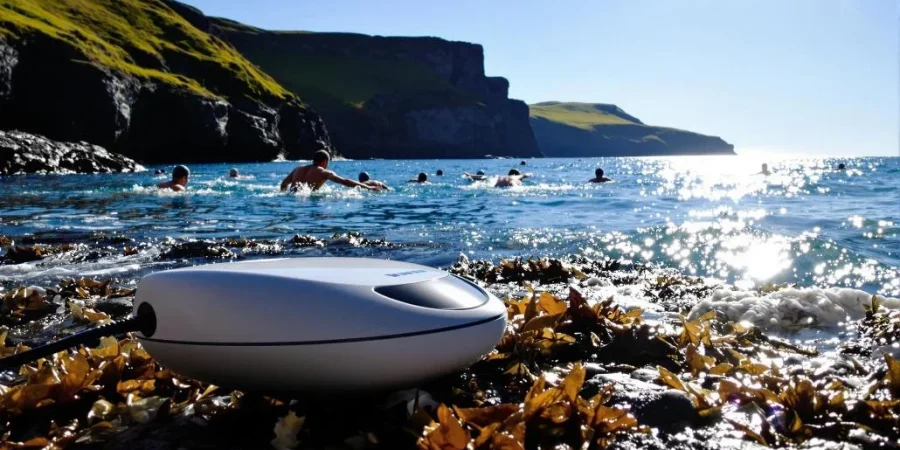As I investigate the rising trend of cold water swimming in Northern Ireland, I cannot help but notice the stark contrast between the invigorating experience it offers and the concerning state of our local water quality. With only a fraction of our rivers and lakes meeting good ecological standards, the implications for swimmers are significant. It is crucial to understand how infrequent water quality monitoring affects our safety and enjoyment. What measures can we advocate for to ensure that our chilly dips remain both refreshing and safe?
Key Takeaways
- Cold water swimming is popular in Northern Ireland, but fewer than 33% of rivers and 14% of lakes achieve good ecological status for safety.
- Infrequent water quality monitoring and outdated equipment hinder the assessment of cold water swimming locations in Northern Ireland.
- Sewage discharges significantly degrade water quality, increasing health risks for swimmers due to harmful bacteria and pathogens.
- Local groups promote safe swimming hotspots, emphasising the importance of checking water quality before swimming to avoid health issues.
- Seasonal changes and weather impacts, such as rainfall, can lead to runoff and contamination, affecting water quality for cold water swimming.
Current State of Water Quality
In Northern Ireland, the current state of water quality paints a concerning picture. Honestly, it feels like we're stuck in a never-ending game of "Where's the Good Water?" Spoiler alert: it's not easy to find.
Let's break it down:
- Less than one-third of our rivers have good ecological status.
- Only 14% of lakes can boast a solid rating.
- And guess what? Not a single lake or river is in good chemical status. Yikes!
Agricultural practices are introducing far too many nutrients into the mix—373 incidents linked to farming between 2017 and 2021.
With only 1% of farms inspected each year, it's like giving a child a cookie jar and saying, "Just don't eat them all!"
Interestingly, the recent OEP report confirmed full implementation of Bathing Water Regulations, which aims to improve water quality across the region.
Now, I don't want to put you off that refreshing dip, but we've got some serious work to do.
Improving water quality and ecological status should be a community effort. After all, we all want to enjoy our beautiful rivers and lakes, right?
Impact of Sewage Discharges
When I think about jumping into cold water, the last thing I want is to swim with a side of sewage.
Seriously, untreated sewage can carry bacteria and viruses that turn a refreshing dip into a gastrointestinal nightmare.
It's a bit like going to a fancy restaurant only to find out they serve food that's been left out in the sun—yikes! In Northern Ireland, many popular swimming locations, such as Brompton Bay, are gaining popularity, making water quality monitoring more critical than ever.
Health Risks Overview
Swimming in cold water can be invigorating, but it's crucial to be aware of the health risks associated with sewage discharges.
You might think, "What's a little murky water?" Well, let me tell you—it's not just unappealing; it can lead to gastrointestinal infections. Yes, you heard that correctly.
When we swim in polluted waters, we're taking a considerable risk. If that contaminated water is ingested or even comes into contact with our skin, we're facing some serious health issues. Cold water temperatures can also lead to Cold Water Shock, putting swimmers at even greater risk of drowning.
Nobody wants a one-way ticket to the toilet for days on end. Trust me, that's not the kind of bonding experience you want with your friends during a chilly dip.
Now, I understand that cold water swimming can enhance your mental resilience and help you connect with nature.
But let's not overlook the potential dangers lurking beneath the surface. So, the next time you're tempted to take the plunge, be sure to check the water quality first.
Ecosystem Effects Explained
Cold water swimming offers a refreshing escape, but the impact of sewage discharges on our ecosystems is a serious concern we can't ignore.
Picture this: you're diving into the chilly water, but lurking beneath the surface are pollutants that can wreak havoc on our aquatic friends.
Sewage discharges can lead to water quality degradation, destroying habitats and causing biodiversity loss. Increased nutrients from these discharges can kickstart toxic algal blooms—yikes! Not exactly the scenic swim we signed up for, is it? For instance, Helens Bay is a popular spot for swimmers, but it is crucial to monitor water quality to ensure a safe and enjoyable experience.
Let's not forget about microbiological contamination. Sewage can introduce pathogens that threaten both our health and the health of wildlife.
Remember that last time you thought, "I'll just swim a little longer"? Think again.
Long-term consequences include chronic pollution and a slow path to ecosystem restoration.
If we want to enjoy our cold water swims guilt-free, we need to advocate for biodiversity conservation.
Popularity of Cold Water Swimming
Is there anything more invigorating than immersing yourself in chilly waters? Cold water swimming has gained quite a following lately, and let me tell you, it's not just about the shock to your system. It's a full-on community experience, where you plunge headfirst into camaraderie and fresh air, all while raving about the health benefits. Who knew that freezing your backside off could actually help with sleep and stress?
Here's a quick look at how it's spreading like wildfire:
| Trend | Details |
|---|---|
| Increasing Participation | 22% of people swam in 2020 |
| Community Engagement | Local groups recommend hot spots |
| Economic Benefits | Wild swimming enhances local tourism |
| Health Benefits | Reduced anxiety and better sleep |
It's not just a solo venture; it's about connecting with others who share your passion. Additionally, the popularity of swimming has seen increased participation in recent years, emphasizing its role as a vital community activity. And let's be honest, nothing beats chatting with fellow swimmers post-dip, comparing who had the most dramatic entrance. Plus, the local economies are reaping the rewards too, proving that splashing about can be good for business. So, why not join the wave?
Safety Measures for Swimmers
During your swim, buddy up! Having someone nearby means you've got a built-in support system. Plus, you can share the "why did I think this was a good idea?" laughs. And don't forget about emergency preparedness. Always carry a mobile phone and a whistle. Swimming with a buddy enhances safety through mutual vigilance, so make sure to look out for each other. If things go awry, you want to be the one calling for help, not the one needing it.
Monitoring and Data Limitations
Numerous challenges arise when it comes to effectively monitoring water quality.
It's a bit like trying to catch fish with a broken net—frustrating and often unproductive.
Take a moment to consider these data standardisation challenges and technology adoption barriers:
- Lack of Standardised Methods: Different monitoring techniques result in inconsistent data. One agency's "clean" might be another's "questionable."
- Infrequent Sampling: Sporadic checks mean we might miss critical changes in water quality. Who wants to swim in a mystery pool, right?
- Outdated Equipment: Seriously, using technology from the Stone Age? It's akin to trying to send a text on a rotary phone.
And let's not overlook those pesky geographical barriers.
Remote areas are often neglected, leaving us in the dark about their water quality. Wild swimming is gaining popularity, which heightens the need for reliable monitoring in these areas.
Seasonal variations also complicate matters; one month, it's crystal clear, and the next, it's a murky mess.
With inadequate funding and limited public access to data, it feels as though we're navigating through a maze blindfolded.
Recommendations for Wild Swimming
When it comes to wild swimming, choosing the right location can significantly enhance your experience. Believe me, you certainly don't want to find yourself splashing about in murky waters or evading jellyfish!
Some excellent spots in Northern Ireland include Brompton Bay and Helen's Bay, both ideal for swimmers of all ages. If you're feeling adventurous, why not give Murlough Beach a go with its stunning views? Additionally, wild swimming can provide better sleep quality due to the benefits of cold-water immersion.
Now, let's discuss swimming etiquette. Always swim with a buddy—nobody wants to be the lone ranger out there. Keep an eye on less confident swimmers, and remember, shouting "Cannonball!" is only acceptable if you're certain it's safe to jump in!
As for essential gear, a wetsuit will keep you warm, and a swim cap can enhance your visibility. Don't forget to bring a towel and some snacks—because who doesn't enjoy a post-swim treat?
And, of course, always check the depth before diving in; you wouldn't want to discover hidden rocks the hard way.
Frequently Asked Questions
What Are the Health Benefits of Cold Water Swimming?
I've found that cold water swimming enhances my immune response and offers cardiovascular benefits. It's invigorating, helps me feel connected to nature, and fosters a sense of belonging with others who share this refreshing experience.
How Can I Report a Sewage Overflow?
If I notice a sewage overflow, I report it immediately. I use the NIEA contact or DAERA's online tool, providing details such as location and time. It is vital to follow these reporting procedures for the safety of our community.
Are There Specific Times to Avoid Swimming Due to Water Quality?
When I think about swimming safety, I always check for pollution alerts. It's prudent to avoid swimming after heavy rain or during advisories, ensuring our shared waters remain clean and enjoyable for everyone.
What Organizations Monitor Water Quality in Northern Ireland?
I've learned that organisations like the NIEA monitor water quality through regular testing, effectively addressing pollution sources. Their commitment to safeguarding our environment helps us all feel secure and connected to our precious water resources.
How Does Swimming in Cold Water Affect Mental Health?
I've found that cold exposure really elevates my mood. It's not just about the chill; it fosters a sense of belonging among fellow swimmers, creating connections that enhance our mental health and overall well-being together.
Conclusion
So, here we are: cold water swimming has taken off, but let's not dive in headfirst without checking the water quality first. With less than a third of our rivers being deemed "good" and our lakes not faring much better, it's time we advocate for improved monitoring. After all, who wants to trade a refreshing swim for an unexpected health scare? Let's stay informed, push for change, and ensure our wild swimming adventures are safe and enjoyable!



